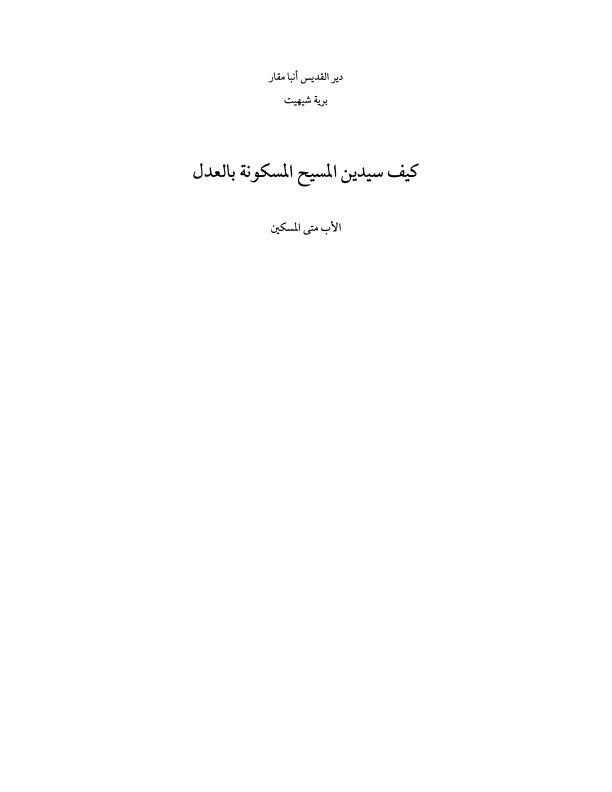
كيف سيدين المسيح المسكونة بالعدل ["How will Christ judge the inhabited world with justice?"] PDF
Preview كيف سيدين المسيح المسكونة بالعدل ["How will Christ judge the inhabited world with justice?"]
- هل سيظهر الحمل الوديع بصورة الغاضب المنتقم ؟
- هل ستخرج كلمات اللعنة من فمه على الخطاة، ويترك عنه حنانه الذي غُلب يوماً من فرط تباريحه، وغفر لهم حتى حماقة صلبه؟
- هل تستريح أحشاء رحمته وهو يأمر بإبعاد الخطاة عنه إلى الأبد؟
- هل يتعذب الخطاة عذابهم الأبدي وهو راضٍ عن ذلك كل الرضى؟
["Will the meek pregnancy appear as an angry vengeful?
Will the words of the curse come out of his mouth on sinners, and will he leave his tenderness, which was once overcome by his excessiveness, and forgave them even the folly of his crucifixion? Will the bowels of his mercy rest while he commands that sinners be banished from him forever?Do sinners suffer their eternal torment while He is fully satisfied with it?"]
This is a little religious text, which must be translated in English as "How will Christ judge the inhabited world with justice?" [Arabicكيف سيدين المسيح المسكونة بالعدل, pronounced as "kayf sayidayn al-masih al-maskunat bialeadl]. The text, with just 15 pages, is signed by Fray Matthew, the Poor, in Arabicالأب متى المسكين [al'ab Mataa al-miskinu).
Abba Matta el-Meskeen (also written as Abba Matta al-Mezkin) was a Coptic-Ortodox monk. Known in the West as Matthew the Poor, Abba Matta is widely regarded as the greatest Egyptian elder since St. Antony the Great. He produced a huge and varied body of work in Arabic, only a little of which has been translated into English. In addition, a great many of his informal talks to monks and visitors were recorded. He had a marvelous ability to communicate the deepest spiritual truths in the simplest and most practical language, making them accessible to laypeople as well as monastics. He speaks to the heart rather than the head, gently exhorting the reader to pursue a deeper life in Christ.
We can learn more about Abba Mata el-Meskeen reading the entry at the Wikipedia, the Free Encyclopedia. This article so begins: "Father Matta El Meskeen (English: Matthew the Poor; 20 September 1919 – 8 June 2006), born Youssef Iskandar, was a Coptic Orthodox monk. He was the key figure in the revival of Coptic monasticism which began in 1969 when he was appointed to the Monastery of St. Macarius in the Wadi El-Natrun in Egypt. By the time of his death the community had grown from 6 aged monks to 130 monks, and as many other monasteries were revived, new ones also began to open. He was twice nominated to become Coptic Pope, but was not chosen in either case.
Matta was also a theologian, and author of 181 books and hundreds of journal articles on Biblical exegesis, Ecclesiastical rites, spiritual and theological matters, and much more. Some of these writings were controversial."
